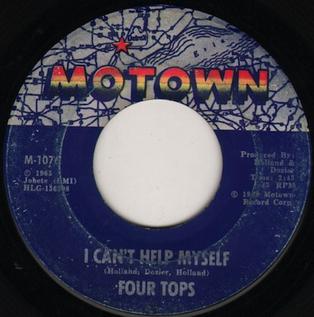
"I Can't Help Myself" is a 1965 song recorded by the Four Tops for the Motown label.

"Body Language" is a 1982 song by British rock band Queen. It was written by the band's lead singer Freddie Mercury and was a hit in North America, where it received extensive radio play. However, the single only received a lukewarm response in the United Kingdom. The track was the second single released from their 1982 album Hot Space. The music video for the song was the first one to be banned from MTV for its nudity, despite the members of Queen being fully clothed.
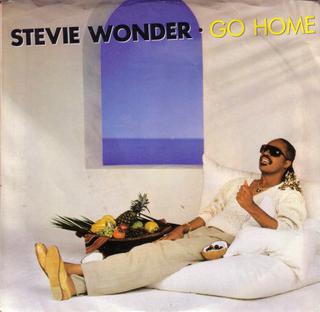
"Go Home" is a song by Stevie Wonder, released as the second single from his twentieth studio album, In Square Circle (1985). The song showcased the narrator's plea to a young woman to go home, though the girl tries to get the narrator to stay with her. In the US, the song peaked at #2 on the Billboard R&B chart and #10 on the Billboard Hot 100 and, to date, is Wonder's last song to reach the US top ten on the Hot 100. "Go Home" also topped both the Billboard dance chart and the Billboard Adult Contemporary chart.

"Burn Rubber (Why You Wanna Hurt Me)" is a song originally performed by The Gap Band in 1980 and written by member Charlie Wilson, Rudy Taylor, and producer Lonnie Simmons.
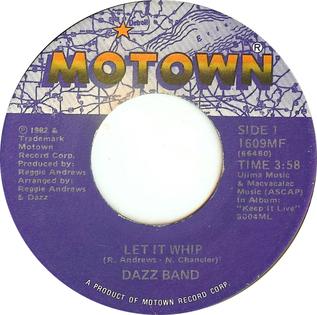
"Let It Whip" is a 1982 single by the Dazz Band and their biggest hit, peaking at number one on the R&B chart for five non-consecutive weeks. The single also reached number two on the Dance chart and number five on the Billboard Hot 100 chart. The song won the 1982 Grammy Award for Best R&B Performance by a Duo or Group with Vocals.
"Over and Over" is a song written by Robert James Byrd and recorded by him using the stage name Bobby Day. Day's version entered the Billboard Hot 100 in 1958, the same week a version of the same song by Thurston Harris entered the chart. Day's version reached #41, and was the B-side to "Rockin' Robin". Thurston Harris' version peaked at #96. In the song, the singer describes going to a party with misgivings of having a good time, until he sees a pretty girl. The singer attempts to ask her out, but she is waiting for her date to arrive. He vows to try "over and over".

"Rock the Boat" is a song by American trio The Hues Corporation, written by Wally Holmes. "Rock the Boat" was first featured on their 1973 debut studio album Freedom for the Stallion. It was released as the third single from the album in early 1974, to follow up Stallion's title song, which had peaked at number sixty-three on the Hot 100, and "Miracle Maker " which did not chart.
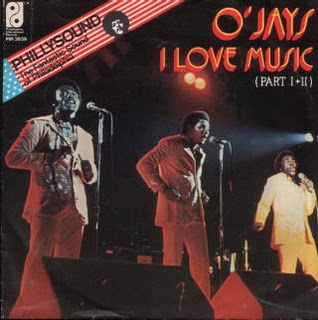
"I Love Music" is a song by American R&B group The O'Jays. It was written by production team Gamble and Huff. The song appeared on The O'Jays 1975 album, Family Reunion. The single reached number five on the US US Billboard Hot 100 and number one on the soul singles chart. In the UK, the song peaked at number 13 in the Top 40 singles charts in March 1976. The single spent eight weeks at number one on the US Disco File Top 20 chart.

"Take Your Time (Do It Right)" is the debut single by American R&B group the S.O.S. Band. It was released as the lead single from their debut studio album, S.O.S. (1980) on March 18, 1980 through Tabu Records, three months before the album's release.

"Another Star" is a song written and performed by Stevie Wonder from his 1976 album Songs in the Key of Life. It is the final track on side four of the double LP. The flute player Bobbi Humphrey appears in the last section of the song.

"I'll Be Good to You" is a 1976 hit song by R&B duo the Brothers Johnson. George Johnson, one of the two Johnson brothers in the band, wrote the song after deciding to commit to a relationship with one woman, instead of dating several at a time. While George was recording a demo for the song, family friend Senora Sam came by and added some lyrics. Brothers Johnson producer and mentor Quincy Jones heard the song, liked it, and convinced George to sing lead on the finished track. Released from their debut album, Look Out for #1, it was a top-ten hit on the Billboard Hot Singles Charts, peaking at number three, and a number one song on the Billboard R&B Charts during the summer of 1976. The single was later certified gold by the RIAA.

"Do It ('Til You're Satisfied)" is a popular song by funk group B. T. Express, written by songwriter Billy Nichols.
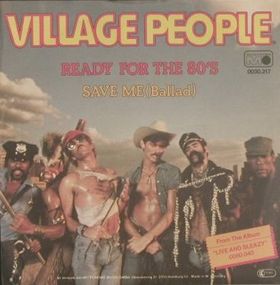
"Ready for the 80's" is a song recorded by American disco group the Village People. It was released in 1979 as the lead single from the group's fifth album Live and Sleazy. It peaked at #52 on the Billboard Hot 100 pop singles chart. On the US disco chart, along with the track, "Sleazy", "Ready for the 80's" peaked at #26.
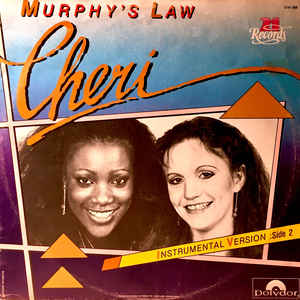
"Murphy's Law," is the name of a single by the Canadian/American female dance music duo Chéri.

"Give It to Me Baby" is a song written by American singer Rick James. Taken from his album Street Songs, the song charted on the Billboard Hot 100, spending two weeks at No. 40 and spent five weeks at No. 1 on the R&B chart. Two other tracks from Street Songs, "Super Freak" and "Ghetto Life", topped the American dance chart for three weeks in the summer of 1981. The song proved to be even more successful with R&B and dance club audiences. Part of the background vocals were sung by Temptations member Melvin Franklin.
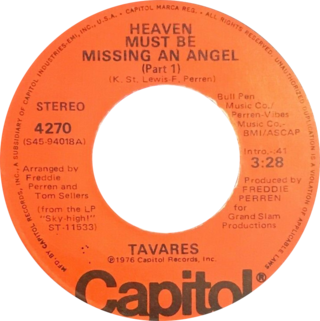
"Heaven Must Be Missing an Angel" is a disco song written by Freddie Perren and Keni St. Lewis. It was recorded by the American band Tavares in 1976. It was released as the first single from their fourth album, Sky High! (1976), and was split into two parts: the first part was 3 minutes and 28 seconds in length, while the second part was 3 minutes and 10 seconds. "Heaven Must Be Missing an Angel" was re-released in February 1986.

"Keep On Dancin'" is the debut single by Gary's Gang, a disco group from Queens, New York. The song became successful in several countries in 1979.
"Inside Love " is a song written by Kashif, and performed by American R&B singer George Benson.

"It's a Miracle" is a 1975 single by Barry Manilow and was the second release from his album, Barry Manilow II. "It's a Miracle" went to number twelve on the U.S. Billboard Hot 100 and was Manilow's second number one on the U.S. Easy Listening chart, spending one week at number one in April 1975. The single also peaked at number fifteen on the disco/dance chart, and was the first of four entries on the chart. "It's a Miracle" was followed by "Could It Be Magic".

"I Didn't Mean to Turn You On" is the debut single written by Jimmy Jam and Terry Lewis and originally performed by American singer Cherrelle in 1984. In 1986, "I Didn't Mean to Turn You On" was covered by English singer Robert Palmer. Palmer's cover fared better on the pop chart while Cherrelle's version was a hit on the R&B chart.


















